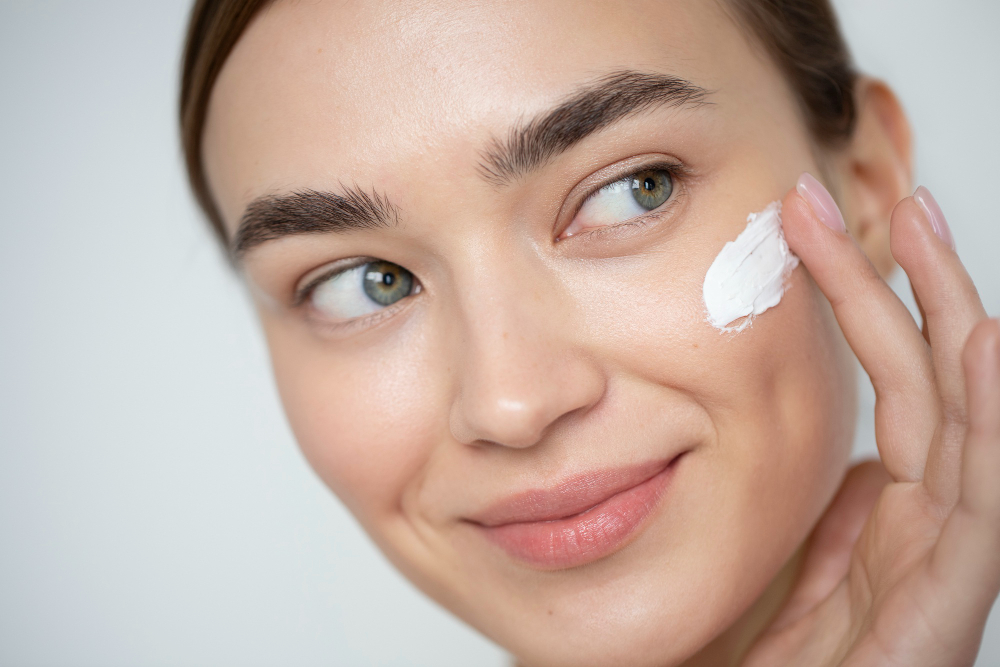
10 Best Solutions: A Consumer’s Guide to Facial Creams for Every Face

Navigating the vast ocean of facial creams can feel like searching for a needle in a haystack.
With shelves overflowing with promises of ageless wonders and radiant complexions, choosing the right one can be daunting.
Fear not, beauty enthusiasts!
This comprehensive guide dives deep into the world of facial creams, offering insightful reviews and tips to help you find the perfect solution for your unique needs.
Understanding Your Skin’s Story
Before embarking on your facial cream odyssey, understanding your skin type is crucial.
It’s the map that guides you towards formulations that address your specific concerns.
Here’s a breakdown of the most common skin types:
- Normal Skin: The lucky ducks who have balanced oil and moisture levels, enjoying a healthy glow.
- Dry Skin: Prone to flakiness, tightness, and a lack of luster, dry skin craves hydration and nourishment.
- Oily Skin: Characterized by excess sebum production, oily skin can be prone to shine, breakouts, and enlarged pores.
- Combination Skin: A mix of oiliness and dryness, often with a T-zone that’s greasier than the cheeks.
- Sensitive Skin: Easily irritated by ingredients or environmental factors, sensitive skin needs gentle and calming formulas.
Remember: “Your skin’s needs can change throughout your life due to factors like age, hormones, and environment,” says Dr. Emily Jones, a renowned dermatologist.
“So, be flexible and adjust your skincare routine accordingly.”
Demystifying Facial Cream Ingredients
Facial creams are a complex blend of ingredients, each playing a specific role in your skin’s health.
Here’s a quick guide to some key players:
- Humectants: Attract and retain moisture, like hyaluronic acid and glycerin.
- Emollients: Soften and smooth the skin, like shea butter and jojoba oil.
- Occlusives: Form a protective barrier to prevent moisture loss, like petrolatum and beeswax.
- Antioxidants: Combat free radical damage, like vitamin C and E.
- Retinoids: Boost collagen production and cell turnover, like retinol and tretinoin.
- AHAs/BHAs: Exfoliate dead skin cells to reveal brighter, smoother skin, like glycolic acid and salicylic acid.
Note: “Not all ingredients are created equal,” Dr. Jones cautions. “It’s crucial to choose creams formulated for your skin type and free from ingredients that may irritate your skin.”
The Cream of the Crop: Top Picks for Different Skin Types
Ready to discover your perfect facial cream match? Here’s a curated list of top picks for each skin type:
| Skin Type | Cream | Key Benefits |
|---|---|---|
| Normal Skin | La Roche-Posay Toleriane Double Repair Face Moisturizer | Hydrates, protects, and soothes with ceramides and prebiotics. |
| Dry Skin | CeraVe Moisturizing Cream | Intensely hydrates and restores the skin barrier with ceramides and hyaluronic acid. |
| Oily Skin | Paula’s Choice 10% Niacinamide Booster | Controls oil production, minimizes pores, and refines texture with niacinamide. |
| Combination Skin | Clinique Moisture Surge 100-Hour Auto-Replenishing Hydrator | Delivers long-lasting hydration and balances oil production with hyaluronic acid and aloe vera. |
| Sensitive Skin | Aveeno Calm + Restore Nourishing Oat Gel Moisturizer | Soothes and calms irritation with colloidal oatmeal and ceramides. |
Note: This is just a starting point. Consult a dermatologist for personalized recommendations based on your unique skin concerns.
What is the Best Facial Cream?
Determining the “best” facial cream can vary greatly depending on individual skin types, concerns, and preferences.
Different people have different skin needs, and what works well for one person may not be suitable for another.
However, I can provide you with a list of popular and well-regarded facial creams that have received positive reviews.
Keep in mind that it’s essential to choose products based on your skin type (dry, oily, combination, sensitive) and specific concerns (aging, acne, hydration).
- CeraVe Moisturizing Cream: Known for its hydrating properties, it contains ceramides and hyaluronic acid, suitable for various skin types.
- Neutrogena Hydro Boost Water Gel: A lightweight gel formula that is often recommended for those with oily or combination skin.
- La Roche-Posay Toleriane Double Repair Face Moisturizer: Suitable for sensitive skin, this moisturizer helps restore the skin’s natural protective barrier.
- Olay Regenerist Micro-Sculpting Cream: Targets signs of aging and is known for its anti-aging properties.
- Clinique Moisture Surge 72-Hour Auto-Replenishing Hydrator: A gel-cream that provides intense hydration without feeling heavy.
- Kiehl’s Ultra Facial Cream: A popular choice for its lightweight yet deeply moisturizing formula.
- EltaMD PM Therapy Facial Moisturizer: Particularly good for sensitive or post-procedure skin, it helps improve skin texture and tone.
- Aveeno Positively Radiant Daily Moisturizer: Contains SPF and is designed to even out skin tone and texture.
- Embryolisse Lait-Crème Concentré: A French pharmacy favorite, known for its multi-use cream that works as a moisturizer, primer, and makeup remover.
- Cetaphil Moisturizing Cream: A gentle, non-comedogenic option suitable for sensitive skin.
Before trying a new facial cream, it’s advisable to patch test it to ensure you don’t have any adverse reactions.
Additionally, consulting with a dermatologist can help you find the best product for your specific skin needs.
What is Facial Cream Used?
Facial cream, also known as moisturizer or face cream, is a skincare product designed to hydrate and nourish the skin on the face.
Its primary purpose is to maintain and improve the skin’s moisture balance, preventing it from becoming too dry or too oily.
Here are some key functions and benefits of using facial cream:
- Hydration: One of the primary purposes of facial cream is to provide the skin with hydration. This is crucial for maintaining skin health, as well-hydrated skin looks plump, feels soft, and is less prone to issues like flakiness and dryness.
- Skin Barrier Protection: Many facial creams contain ingredients such as ceramides, fatty acids, and lipids that help strengthen the skin’s natural barrier. A strong skin barrier is essential for preventing water loss and protecting the skin from external irritants.
- Preventing Dryness and Roughness: Regular use of facial cream can help prevent dry skin, which can lead to a variety of issues such as redness, itching, and flakiness. It also contributes to a smoother and more supple skin texture.
- Anti-Aging Benefits: Some facial creams are formulated with ingredients like retinol, peptides, and antioxidants, which may help reduce the appearance of fine lines and wrinkles, as well as promote overall skin rejuvenation.
- Soothing and Calming: Facial creams often include ingredients with soothing and calming properties, making them suitable for individuals with sensitive or irritated skin. These ingredients can help reduce redness and inflammation.
- Makeup Application: Applying facial cream before makeup can create a smooth base for foundation and other cosmetics. It can also help makeup adhere better and last longer.
- Sun Protection: Some facial creams come with added SPF (sun protection factor), offering a level of sun protection. However, it’s important to note that for comprehensive sun protection, a dedicated sunscreen is recommended.
It’s important to choose a facial cream based on your skin type and specific skincare needs. Different formulations are available for dry skin, oily skin, combination skin, and sensitive skin.
Additionally, you may want to consider factors such as whether you prefer a lightweight gel, a rich cream, or a specific scent.
Always patch test new products and consult with a dermatologist if you have specific skin concerns or conditions.
What are the Best Anti Aging Facial Creams?
Determining the best anti-aging facial cream can be subjective and depends on individual preferences and skin needs.
However, several products are well-regarded for their anti-aging properties, often containing ingredients known for promoting skin elasticity, reducing fine lines and wrinkles, and providing overall skin rejuvenation.
Here are some popular anti-aging facial creams:
Retinol-based Creams

- RoC Retinol Correxion Deep Wrinkle Night Cream: Contains retinol to target fine lines and wrinkles.
- Neutrogena Rapid Wrinkle Repair Regenerating Cream: Features a combination of retinol and hyaluronic acid for hydration and anti-aging benefits.
Peptide-rich Creams

- Olay Regenerist Micro-Sculpting Cream: Contains peptides to promote collagen production and improve skin firmness.
- StriVectin SD Advanced PLUS Intensive Moisturizing Concentrate: Formulated with peptides and niacinamide for anti-aging benefits.
Hyaluronic Acid-infused Creams

- L’Oreal Paris Revitalift Derm Intensives Hyaluronic Acid Face Serum: Focuses on hydration and plumping with hyaluronic acid.
- Peter Thomas Roth Water Drench Hyaluronic Cloud Cream: Provides intense hydration and helps reduce the appearance of fine lines.
Vitamin C Creams

- C E Ferulic by SkinCeuticals: A potent antioxidant combination of vitamin C, vitamin E, and ferulic acid for brightening and firming.
- TruSkin Vitamin C Moisturizer: Blends vitamin C with botanical extracts to target signs of aging.
Moisturizers with Antioxidants

- Clinique Smart Custom-Repair Moisturizer: Includes a mix of antioxidants to address various signs of aging.
- Kiehl’s Super Multi-Corrective Cream: Contains jasmonic acid, beech tree extract, and hyaluronic acid for multiple anti-aging benefits.
Night Creams

- Estée Lauder Advanced Night Repair Synchronized Multi-Recovery Complex: Designed to work overnight, promoting skin repair and renewal.
- Cerave Skin Renewing Night Cream: Features ceramides and peptides for overnight hydration and anti-aging benefits.
It’s important to note that individual responses to skincare products can vary, and what works for one person may not work as well for another.
Additionally, consistent use of sunscreen is crucial for preventing further signs of aging.
Before starting any new skincare regimen, especially one focused on anti-aging, it’s advisable to perform a patch test and consult with a dermatologist for personalized recommendations based on your skin type and concerns.
Does Facial Cream Really Work?
Yes, facial creams can be effective in providing various benefits to the skin.
The effectiveness of a facial cream depends on its formulation, the specific needs of your skin, and how consistently you use it.
Here are some ways in which facial creams work:
- Hydration: Facial creams are designed to hydrate the skin, preventing it from becoming dry and flaky. Proper hydration is essential for maintaining healthy and supple skin.
- Moisture Balance: They help balance the moisture levels in the skin, ensuring that it is neither too oily nor too dry. This is important for overall skin health and comfort.
- Skin Barrier Support: Many facial creams contain ingredients like ceramides, fatty acids, and antioxidants that support the skin’s natural barrier. A strong skin barrier helps protect against environmental stressors and prevents water loss.
- Anti-Aging: Some facial creams are formulated with anti-aging ingredients, such as retinol, peptides, and antioxidants, which can help reduce the appearance of fine lines and wrinkles and promote collagen production.
- Soothing and Calming: Ingredients like aloe vera, chamomile, and calendula found in some facial creams have soothing and calming properties, making them suitable for sensitive or irritated skin.
- Improving Skin Texture: Regular use of facial cream can contribute to smoother and softer skin texture by preventing roughness and promoting overall skin health.
- Preventing Environmental Damage: Antioxidants in facial creams can help neutralize free radicals, which are molecules that can damage the skin due to factors like sun exposure and pollution.
It’s important to note that the effectiveness of a facial cream can vary from person to person, and choosing the right product for your specific skin type and concerns is crucial.
Consistency in using the product is also key to seeing results.
Additionally, other factors such as a healthy lifestyle, proper skincare routine, and protection from environmental stressors contribute to overall skin health.
If you have specific skincare concerns or conditions, it’s a good idea to consult with a dermatologist who can provide personalized recommendations based on your skin’s needs.
Beyond the Hype: Unmasking Common Facial Cream Myths
The beauty industry thrives on myths and buzzwords. Let’s debunk some common misconceptions about facial creams:
- Myth: The more expensive, the better.
- Fact: While quality ingredients matter, price isn’t always an indicator of effectiveness. Research ingredients and reviews before buying.
- Myth: You need a different cream for day and night.
- Fact: Many creams work effectively for both day and night. Look for ones with SPF protection during the day and retinol for nighttime use, if needed.
- Myth: Organic is always better.
- Fact: While natural ingredients can be beneficial, synthetic compounds can








